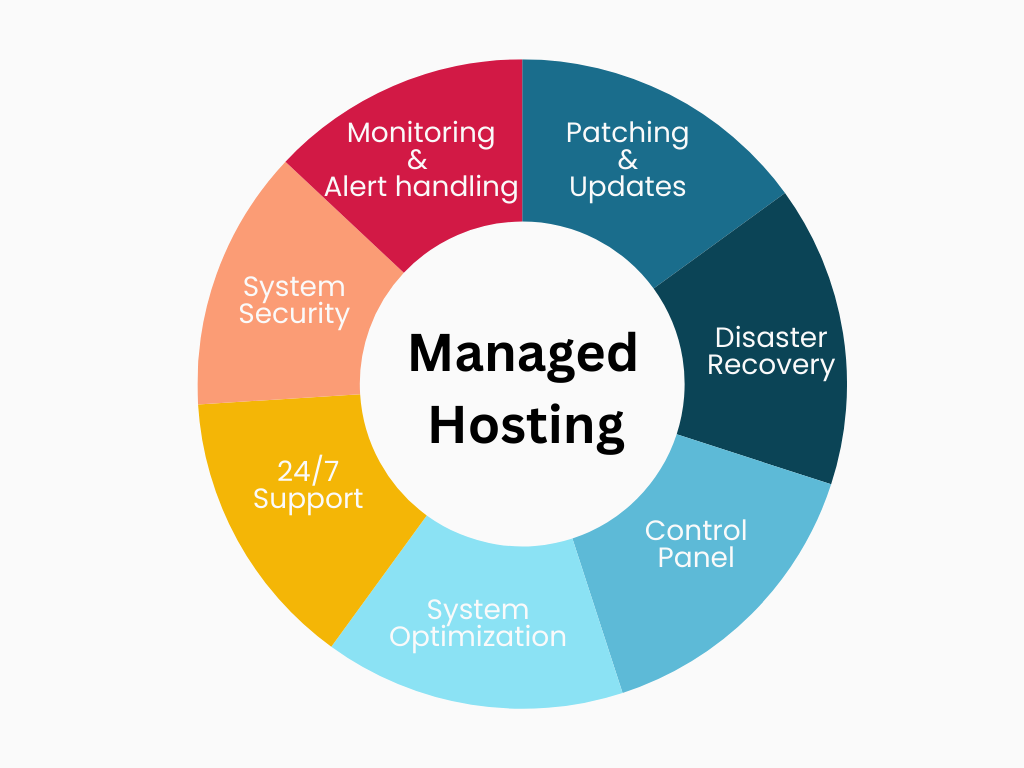
In today’s digital age, a robust online presence is non-negotiable for businesses and individuals alike. However, maintaining a website or application often involves complex technical tasks that can be daunting for those lacking expertise in server management. This is where managed hosting services comes to the rescue. In this blog, we will explore what managed hosting is, its advantages over unmanaged hosting, popular managed hosting providers, and how to choose the best one for your specific needs.
What is Managed Hosting?
Managed hosting is an IT provisioning model in which a service provider leases dedicated servers or virtual private servers (VPS) to a single customer and takes on the responsibility of managing those systems 24/7. This service includes hardware and software setup and configuration, technical support, patch management, system maintenance, monitoring, and regular updates.
Managed hosting providers often offer service-level agreements (SLAs) that outline the scope of services provided. These agreements guarantee that the client’s websites and applications will remain operational, with compensation stipulations in case of service interruptions or server downtime.

The Tradeoffs of Unmanaged Hosting
In unmanaged hosting, it is the client’s primary responsibility for server administration. This entails software upgrades, patching, and monitoring, making it a more hands-on experience. While it provides more control, it can be challenging for those lacking technical expertise.
Popular Managed Hosting Providers
Here is a list of popular managed hosting providers and a brief overview of their specializations:
- Cloudways: Known for its ease of use and excellent support, Cloudways offers managed cloud hosting services with multiple cloud infrastructure options.
- RunCloud: Specializes in simplifying server management, especially for users of cloud-based hosting services like DigitalOcean and AWS.
- ServerPilot: Offers a platform for easy server management and deployment, particularly catering to developers.
- Flywheel: Focuses on managed WordPress hosting, providing speed, security, and scalability for WordPress websites.
- SiteGround: Offers versatile managed hosting solutions, including shared hosting, cloud hosting, and dedicated servers, known for its excellent customer support.
- Gridpane: A powerful platform for managing high-performance WordPress hosting environments.
- Kinsta: Specializes in premium managed WordPress hosting with a strong emphasis on speed and security.
- it’s worth noting that major cloud platforms like AWS, Azure, and Google Cloud also offer managed services. While these cloud giants provide a broader range of services beyond managed hosting, their offerings include fully managed solutions for various aspects of IT infrastructure
It’s worth noting that major cloud platforms like AWS, Azure, and Google Cloud also offer managed services. While these cloud giants provide a broader range of services beyond managed hosting, their offerings include fully managed solutions for various aspects of IT infrastructure.
Pros and Cons of Popular Managed Hosting Providers
To make an informed choice, it’s essential to consider the pros and cons of each provider:
Cloudways >>
- Pros: User-friendly interface, multiple cloud providers, excellent support.
- Cons: Pricing can be higher for high-traffic websites.
RunCloud >>
- Pros: Simplified server management, supports various cloud platforms.
- Cons: May require some technical knowledge.
ServerPilot >>
- Pros: Developer-friendly, straightforward server management.
- Cons: Limited in features compared to other providers.
Flywheel >>
- Pros: Specialized in WordPress, optimized for speed and security.
- Cons: Focused primarily on WordPress hosting.
SiteGround >>
- Pros: Versatile hosting solutions, and top-notch customer support.
- Cons: Pricing can be steep for larger websites.
Gridpane >>
- Pros: High-performance WordPress hosting, fine-tuned for speed.
- Cons: May require technical expertise for optimization.
Kinsta >>
- Pros: Premium WordPress hosting, outstanding speed, and security.
- Cons: Premium pricing, primarily focused on WordPress.
How to Choose the Best Managed Hosting Service Provider
Choosing the right managed hosting provider depends on your specific requirements. Consider the following factors:
- Website/Application Needs: Analyze your website’s needs, such as traffic volume, content management system, and scalability requirements and see how much storage, space and bandwidth the selected plan provides.
- Budget: Determine how much you’re willing to invest in hosting services and choose the provider that fits your budget.
- Support and SLAs: Review the level of customer support and SLAs offered by the provider. A good provider offers 24/7 support so that they can bring your application back online if something goes wrong.
- Scalability: Ensure the provider can accommodate future growth, with flexibility to scale resources as needed.
- Security: Evaluate the security measures in place to protect your website or application against potential cyber-attacks.
- Review & Reputation: Look for reviews from other users who have used the provider or other reputed technical publications to verify the reputation of the provider.
Conclusion
Managed hosting is becoming increasingly popular due to its convenience and the peace of mind it offers to website owners and businesses. By choosing the right managed hosting provider that aligns with your needs, you can ensure that your online presence remains secure, efficient, and capable of handling your growing demands. Whether you’re a tech-savvy developer or a business owner, managed hosting can be the key to unlocking a hassle-free online experience.


